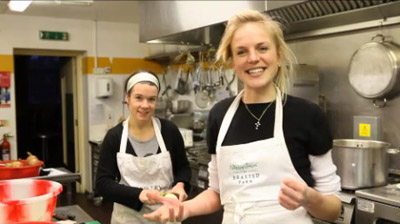Sustain • Food Waste • Food Save
Working hard to preserve, serve and save
 Case study of Rubies in the Rubble, which is a company that actively reduces food waste by transforming surplus food, that would otherwise have been wasted, into chutneys, pickles and jam. The company was set up in 2010 by Jenny Dawson , who after realising that huge quantities of perfectly edible fresh fruit and vegetables are wasted unnecessarily each year, decided to address the problem.
Case study of Rubies in the Rubble, which is a company that actively reduces food waste by transforming surplus food, that would otherwise have been wasted, into chutneys, pickles and jam. The company was set up in 2010 by Jenny Dawson , who after realising that huge quantities of perfectly edible fresh fruit and vegetables are wasted unnecessarily each year, decided to address the problem.
Rubies in the Rubble: background and core values
Jenny grew up on a farm in Scotland, where her mother regularly made preserves from surplus fruit and vegetables. This had always seemed a common-sense and simple way of preserving excess produce. She visited markets in London and saw first-hand the quantity of produce that was being wasted and decided to leave her job in finance and set up a business that would rescue the unwanted stock and turn it into something handmade and delicious.
 Rubies in the Rubble started life as a small operation, by borrowing kitchen space around London in order to sell products at a stall in Borough Market. The kitchen now has a permanent base, onsite at New Spitalfields Wholesale Fruit and Vegetable Market and the team produces around 1,000 jars of chutney a week. The preserves are currently sold at a number of outlets, including Fortnum & Mason, Selfridges, Partridges and Waitrose.
Rubies in the Rubble started life as a small operation, by borrowing kitchen space around London in order to sell products at a stall in Borough Market. The kitchen now has a permanent base, onsite at New Spitalfields Wholesale Fruit and Vegetable Market and the team produces around 1,000 jars of chutney a week. The preserves are currently sold at a number of outlets, including Fortnum & Mason, Selfridges, Partridges and Waitrose.
Rubies in the Rubble seeks to reduce food waste, whilst providing employment to women in the community who are out of work or disadvantaged. The kitchen has a small team of two or three women working at any one time, who are employed through the charity Crisis and are provided with training, and paid a London living wage. The company recognises the importance of investing in people. In fact, the staff wages represent a bigger proportion of costs for Rubies in the Rubble than for many other chutney makers due to their chosen method of production. Sometimes commercial producers of preserves use tinned fruit and vegetables, leading to lower labour costs, as many of the ingredients are pre-prepared and don’t require chopping. In contrast, all the preserves from Rubies in the Rubble are made by hand, from scratch. In this way, the venture aims to tackle the societal problems of social exclusion and wasteful behaviour, one chutney pot at a time.
Everything they do is rooted in three core beliefs: Make use of what you have. Believe in people. Care about your resources.
How Rubies in the Rubble minimises waste
Rubies in the Rubble says that each year in the UK, approximately 18 million tonnes of food is wasted. This is done at an annual cost of £23 billion. Food is wasted for a number of reasons, however all too often, fruit and vegetables are thrown away due to purely aesthetic consumer or retailer preferences. Food businesses are charged a hefty fee for the removal of misshapen or odd-sized fruit and veg and the work of Rubies in the Rubble reduces this type of waste. They work with UK businesses and farmers, to help them to reduce waste and save money in the process.

Now run by Jenny Dawson and Alicia Lawson, the company works from a commercial kitchen in a converted portacabin onsite at New Spitalfields Wholesale Fruit and Vegetable Market. The situation of the kitchen is ideal as it allows the staff to intercept unsold surplus from the market. Around 700,000 tons of fresh produce goes through the market each year and approximately 10,000-11,000 tonnes of fruit and vegetables goes to waste annually. Close to 60% of this waste is fit for human consumption and it is this portion of the “rubble” that Jenny and Alicia target to transform into “rubies”.
Produce arrives in the morning and is brought back to the kitchen where the small team washes, sorts and chops everything. The ingredients are cooked in batches of 30kg at a time and each batch is boiled for several hours until it is ready to be put in jars.
Rubies in the Rubble has come a long way from its humble beginnings, but Jenny and Alicia have future plans to develop new products for the brand. They hope to grow further and to continue to achieve what they set out to do – to save unnecessary waste and create more jobs for people who need them.
NOTE: Rubies in the Rubble is in the process of developing a new business model. Check www.rubiesintherubble.com for updates.
This case study has been prepared by Sustain: The alliance for better food and farming, as part of the FoodSave project, helping small- and medium-sized enterprises to reduce food waste. If you run a small food business in London and want help reducing your food waste, please get in touch. Email:charlotte@sustainweb.org; tel: 0203 5596 777; web: www.sustainweb.org/foodsave/

FoodSave is funded by the European Regional Development Fund (ERDF), the London Waste and Recycling Board (LWARB) and the Mayor of London, co-ordinated by the Greater London Authority (GLA) and supported by the London Food Board.
Food Waste: Sustain supports a reduction in food surplus, loss and waste.
